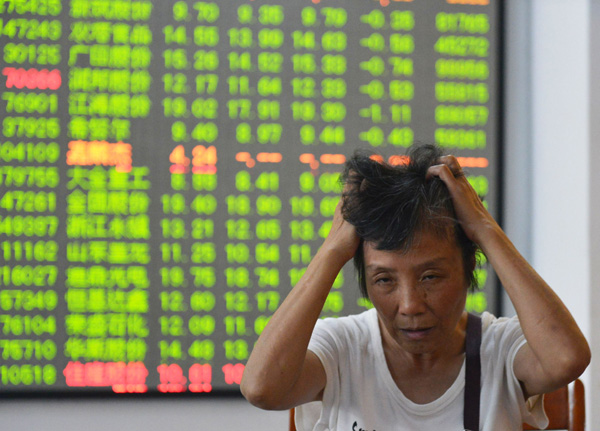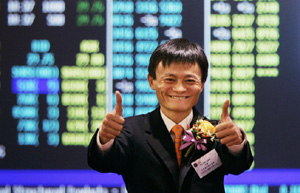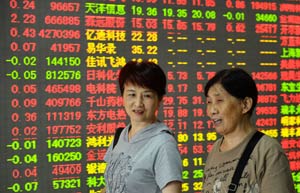 |
|
An investor at a securities firm's outlet in Hangzhou, capital of Zhejiang province. The Shanghai Composite Index slumped 1.8 percent to 2,296.56 at the close on Tuesday. LONG WEI/CHINA DAILY |
Share prices on the mainland tumbled on Tuesday, sending the benchmark index to the biggest drop since March, after foreign direct investment sank to a four-year low and investors speculated that new share sales would divert funds.
SAIC Motor Corp and Hisense Electric Co slid more than 3 percent to lead declines for consumer companies reliant on economic growth. Apple Inc supplier Han's Laser Technology Co fell 4.8 percent, trimming this year's gain to 42 percent, while Yonyou Software Co lost 6.2 percent, dragging down a gauge of technology shares to the biggest loss among industry groups.
The Shanghai Composite Index slumped 1.8 percent to 2,296.56 at the close, as the value of shares traded jumped to the highest since Nov 12, 2010.
Tuesday's report showing FDI slumping 14 percent followed data indicating the weakest industrial-output expansion since the global financial crisis and moderating investment and retail sales growth.
 |

|
"August data are far worse than expected and with the new IPOs there's renewed fears about liquidity," said Zhang Haidong, an analyst at Tebon Securities Co in Shanghai. "These two factors have been weighing on stocks and this slump may continue for the next two weeks."
The Shanghai index had rallied 14 percent since mid-June through Tuesday, fueled by prospects for stimulus and speculation an exchange link between Shanghai and Hong Kong will fuel inflows. The measure is valued at 8.3 times 12-month projected earnings, after hitting the highest levels this year earlier this month.
As of Tuesday, 419 out of the 1,011 stocks in the Shanghai index had a 14-day relative strength index of more than 70, the most since Nov 23, 2009. Meanwhile, 194 stocks traded at new 52-week highs, the most since Nov 23, 2009.
The CSI 300 Index slid 2 percent, while the ChiNext plunged 3.5 percent. The Hang Seng China Enterprises Index dropped 1.1 percent, capping the steepest five-day loss since June 2013.
Inbound investment was $7.2 billion in August, down 14 percent from a year earlier, the Ministry of Commerce said on Tuesday in Beijing after a 17 percent drop in July. It was the first back-to-back decline of more than 10 percent since 2009, based on previously reported data compiled by Bloomberg.
Economists at banks including Royal Bank of Scotland Group Plc cut their 2014 expansion forecasts after the weekend data and said they anticipate the government will step up the rollout of measures to support the economy.
A gauge of consumer-discretionary stocks in the CSI 300 dropped 2.8 percent, the second most among 10 industry groups. SAIC Motor, China's biggest listed automaker, posted its biggest loss since July with a 4.5 percent loss, while Hisense Electric fell 3.2 percent, paring this month's gain to 22 percent.
A measure of technology shares in the CSI 300 slid 4.3 percent for the biggest loss since December. Han's Laser dropped the most in four months. Goertek Inc, another supplier to Apple, declined 1.6 percent.
Apple may have to wait until next year to get approval to sell its new iPhones in China after it failed to reach an agreement with the Ministry of Industry and Information Technology this month, the 21st Century Business Herald reported, citing an unidentified person close to Apple.
Anhui USTC iFlytek Co slumped 5.4 percent. Leshi Internet Information & Technology Co and Huayi Brothers Media Corp, the biggest companies in the ChiNext, slid at least 2.2 percent.
